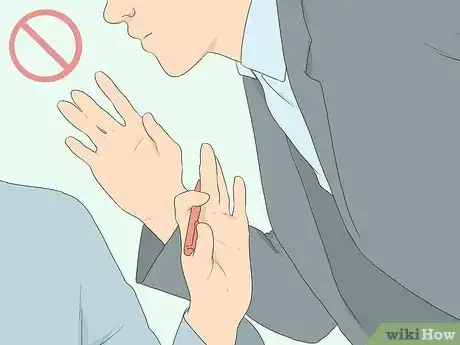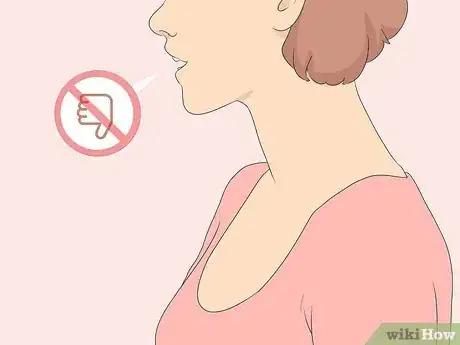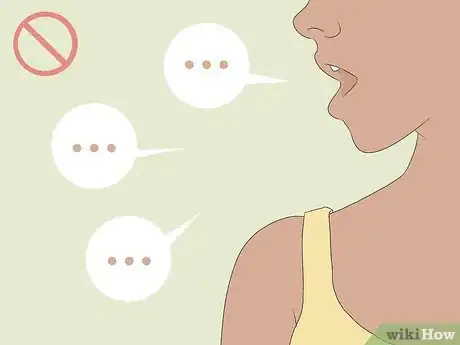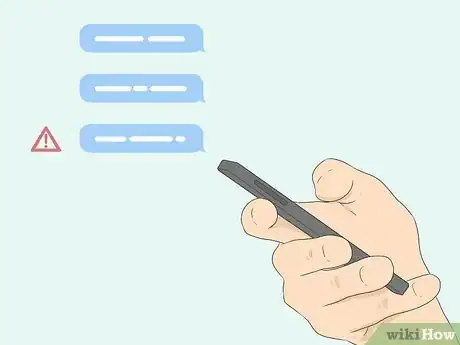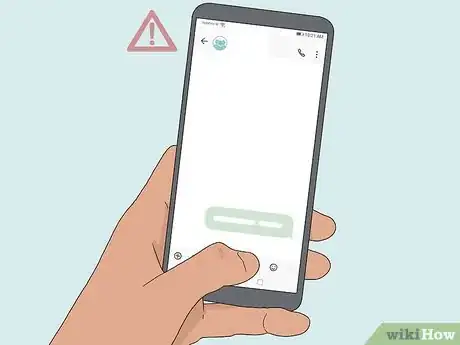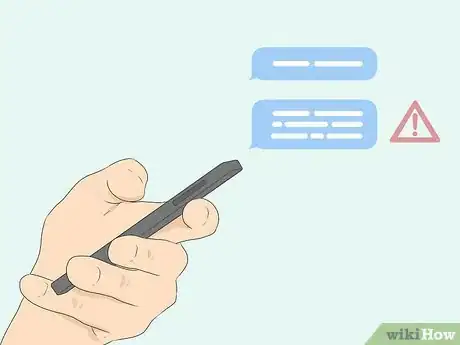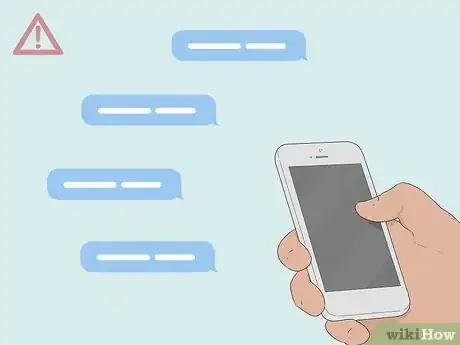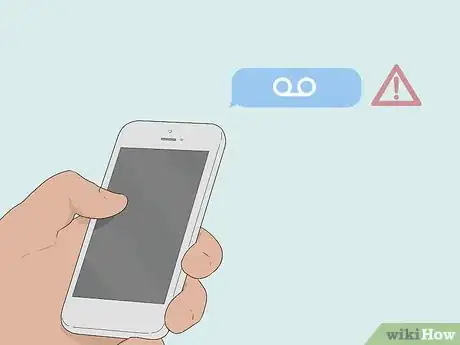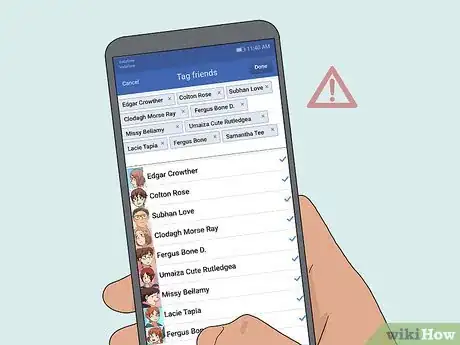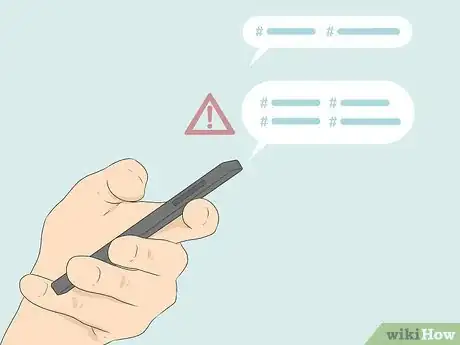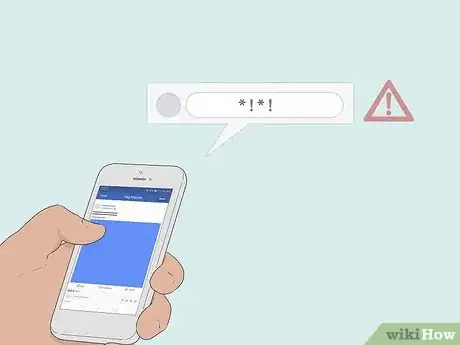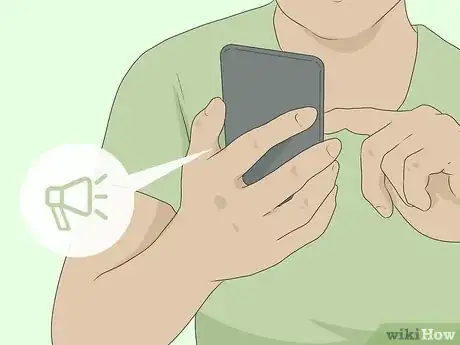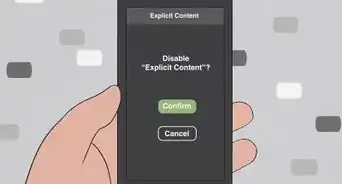This article was co-authored by Lynn Kirkham and by wikiHow staff writer, Amber Crain. Lynn Kirkham is a Professional Public Speaker and Founder of Yes You Can Speak, a San Francisco Bay Area-based public speaking educational business empowering thousands of professionals to take command of whatever stage they've been given - from job interviews, boardroom talks to TEDx and large conference platforms. Lynn was chosen as the official TEDx Berkeley speaker coach for the last four years and has worked with executives at Google, Facebook, Intuit, Genentech, Intel, VMware, and others.
There are 12 references cited in this article, which can be found at the bottom of the page.
This article has been viewed 1,844,130 times.
If you are worried about annoying other people and are seeking solutions to solve that problem, you have already won half the battle. All it takes is being self-aware and adjusting the way you interact with the people around you. Pay attention to the way you speak to people in person, through text, and online, and tweak any behavior that you are worried about. It is also important to respect the boundaries of others and give them the right amount of personal space.
Steps
Talking in Person
-
1Listen more and talk about yourself less. People are probably going to get annoyed if you make everything about you. If you have exciting news or something cool to share that adds to the conversation, you do not have to hold it in. But try to give other people a chance to contribute to and lead conversations.[1]
- Don't automatically resort to chattering about yourself when a conversation stalls. Instead, try asking other people questions about themselves and really listen to their answers.
- For example, you might say something like, "You've mentioned before that you like K-pop music. Do you have a favorite band?"
- You might say to a friend, "Tell me about your weekend—I'm dying to know how your date with Elliot went!"
-
2Don't interrupt people when they're talking. It's easy to irritate someone if you interrupt them when they're in the middle of a sentence. Interrupting basically communicates to them that you have no interest in what they're saying, or that what you want to say is more important. Let people complete their sentences before contributing to the conversation.
- It can help to pause for a few seconds to make sure they're finished before you share your thoughts.
- No one appreciates being interrupted, but it can get you into real trouble if you habitually interrupt a teacher, boss, or other authority figure.
Advertisement -
3Spend less time talking about negative stuff. It is totally normal to vent and share negative things sometimes, especially with close friends, but if every sentence out of your mouth is a complaint or negative, people may start to avoid you. Also, constant negative commentary at work or in other group situations tends to create a toxic environment for everyone. Try to look on the bright side and spread positivity instead of negativity![2]
- For example, instead of saying, "Ugh, they're serving that disgusting meatloaf in the cafeteria again today," you might say, "Good thing the cafeteria is serving pumpkin pie today. Delicious pie will help us all forget about that meatloaf!"
-
4Avoid oversharing to prevent others from feeling awkward. Sharing detailed information about your personal life can make others really uncomfortable, especially coworkers and acquaintances. Depending on what you're sharing, your friends might also get pretty annoyed! Avoid telling people intimate details about your love life or physical health unless you know them well.[3]
- For example, if your coworker asks you how your weekend went, you probably shouldn't respond with a monologue about your hemorrhoid flare up. Something like, "I was actually feeling pretty under the weather this weekend," will suffice.
- Don't describe every gory detail of the horror movie you watched last night while your best friend tries to eat her lunch.
-
5Speak at a normal volume to communicate clearly and effectively. It's fine to raise your voice for effect while telling a story or to whisper in a quiet room, but people get really annoyed if you constantly speak at maximum volume or habitually mumble. Match the volume of your voice to those around you and try not to talk over them. If you tend to speak too softly or mumble, work on enunciating and projecting your voice.
-
6Don't repeat words or actions over and over. Doing this might seem cute or funny at first, but constantly repeating the same words or actions (such as making inappropriate sounds or repeating a phrase) is going to get on people's nerves. If a person asks you to stop doing what you're doing, listen to them! If you continue without stopping, you might lose a friend.[4]
- Do not mimic other people or repeat their words back to them for no reason.
- Say something once unless they ask you to repeat it.
-
7Pay attention to the tone of your voice and what it might convey. Even if your words are thoughtful and important, your tone of voice may indicate frustration, crankiness, or a condescending attitude. You may not even realize you are being cranky, but things like being tired or stressed can make you that way.
- If you notice people around you reacting, take a moment to check your tone. Try to speak in a respectful tone and phrase things in a positive manner.
Texting People without Irritating Them
-
1Do not send more than 1 or 2 texts if you have not gotten a response. Sending text after text, especially when you have not even received a response to the first one, will get on the other person's nerves pretty fast. Give them time to respond. Blowing up your friend's phone might seem innocent enough—until you find out later that she was at a funeral and that's why she did not respond right away.
- Repeatedly texting a crush can ruin a romance before it even begins. If you've sent 2 texts and your crush did not answer either of them, they may be trying to tell you they are uninterested.
-
2Avoid group texting unless there is a real reason to do it. Adding your circle of friends or multiple family members to a group text just to share unimportant information will definitely annoy them. Other group members then chime in and suddenly everyone is getting a constant stream of pointless notifications!
- If you have something super brief to share that doesn't require a response, it might be okay occasionally, but otherwise, avoid group texting!
-
3Keep your texts relatively brief. Habitually texting incredibly lengthy or detailed messages irritates others and they may stop reading your texts altogether. If you have something important to say, call them or ask to meet up with them! Keep your texts short, sweet, and to the point.[5]
- Writing text "novels" might be especially annoying for your crush or someone you went on 1 date with.
-
4Do not send out mass texts to fish for ideas or things to do. People really don't like it when you send out a mass text on a Friday night that says, "What's going on this weekend?" or "What are you up to tonight?" A mass text like, "So what movie should I watch tonight?" is also pretty annoying. Mass texts are always super obvious and they feel really impersonal.[6]
- If you do send out mass texts, you may notice that you get fewer and fewer responses over time.
-
5Avoid texting to inform someone that you just left them a voicemail. If you called your friend and it went to voicemail, just leave a voicemail! Don't follow up your voicemail with a text that says, "Check your voicemail" or "Hey, I'm trying to get in touch with you." If they did not answer your call, they probably are not going to answer your text. Give them time to respond.[7]
- It's okay to be eager to talk to someone! Just try not to overdo it.
Avoiding Annoying Behavior on Social Media
-
1Don't tag people in pointless posts or without their permission. Tagging people in posts, especially posts that have nothing to do with them, is a bad idea. Even if you're posting photographs and they happen to be in some of them, shoot them a message to ask if it's okay to tag them before you do it. This is especially true if you don't know the person well.[8]
- For example, if you are posting your third grade class photo on Facebook, do not search out every person in the image and tag them. Even if you do keep in touch with them, they probably will not appreciate it.
- Tagging all of your friends in a silly meme post is sure to annoy them.
-
2Avoid leaving pointless or awkward comments on other people's posts. Commenting with tons of emojis, making pointless observations, or leaving cryptic remarks on someone else's post is a surefire way to get on their nerves. Before you hit the "Post" button, reread your comment and ask yourself if you really need to post that comment.
- For example, do not post a million heart emojis on every single post your friend makes. It might be cute at first, but it will probably get old fast.
-
3Use relevant hashtags and don't use too many of them. Do not use hashtags that have nothing to do with your actual post. You also do not need to take advantage of the maximum number of hashtags allowed on a social media platform! Use hashtag and keyword tools if you need help finding relevant tags for you or your brand. Choose a handful of the best ones and leave it at that.
- For example, Instagram allows up to 40 hashtags per post. Actually using all 40 of them is really annoying to your followers and to strangers affiliated with that hashtag.
-
4Don't start arguments on other people's posts. In most cases, if someone posts or comments something that you don't like, you probably don't need to inform them that you feel that way. This is especially true if the comment has nothing to do with you. Keep in mind that your comments are public and reflect on you personally. Twitter wars and Facebook arguments pretty much get on everyone's nerves.[9]
- For example, if your friend posts a music video on their Facebook page, you don't need to respond with, "This is a terrible song." If someone else makes a dumb comment, you don't need to interject or get involved.
- Don't correct other people's grammar or spelling mistakes on social media.
-
5Avoid bragging about your life on social media. If you're excited about something, it's probably fine to post about it—once. Going on and on about how great your life is will probably annoy all of your friends and followers. No one wants to see a constant stream of photos on Instagram of the amazing vacation you're on while they're toiling away at work![10]
Being Respectful
-
1Respect people's boundaries. Everybody has boundaries, and they will usually let you know what they are. Your goal is to try to avoid crossing them. Boundaries vary widely from culture to culture and even from individual to individual, so it may take some time to learn a person's boundaries. Be forgiving of yourself and others when mistakes are made, but always try to do better in the future.[11]
- Some boundaries that you might not want to cross include not going through other people's stuff without asking, borrowing things without asking, or showing up uninvited, just to name a few.
-
2Respect personal space and don't touch others without permission. Some people are fine with being touched but others don't like it. You should always ask before touching someone, such as when you want to give someone a hug or put your arm around them.[12]
- For instance, you might say, "Hey, can I give you a hug before we leave?" Be accepting if they say "no." It likely has nothing to do with you.
- Do not go around poking people constantly or even touching their arm if they've expressed they don't like it. Of course, if they are a good friend of yours and they don't mind, then, by all means, have fun. Otherwise, it's always a good idea to just keep your hands to yourself!
-
3Give people emotional space when they ask for it. Sometimes, people just need a break to be by themselves. If they tell you they need a couple of days to themselves, let them have it. Don't try to call every day or email them all the time. Just give them some breathing room.[13]
- Keep in mind that someone wanting to take space away from you may have nothing to do with you. Sometimes, people just need an emotional break or time away from others.
- If in a close relationship, you might have code words for when you need a break, such as "I think I need a time out" or "I could use a brain break for a day."
-
4Be polite and hygienic. Politeness goes a long way to avoid being annoying. If you're being polite, then by definition, you're not being rude. Mind your manners by saying "Please" and "Thank you," and do your best to be kind and gentle to the people around you. Think about how you'd want to be treated and apply that to other people.[14]
- This also means observing the social niceties, like not passing gas, not talking about bodily functions in public, and covering your nose and mouth with your elbow when you sneeze or cough.
- Being hygienic is a way of showing you respect others. If you show up with a sloppy appearance and you haven't brushed your teeth or showered in a few days, that tells the people around you that you don't care about how you appear to them, which isn't respectful.[15]
-
5Be aware of your surroundings. Being aware of your surroundings means paying attention to when you might be causing issues for other people, such as blocking their way by holding a conversation on a sidewalk. Pay attention to where you are and move if you are causing issues for other people.
- For instance, don't stand in an area where people are trying to walk or hold a conversation in a doorway. Be aware of what your kids are doing (if you have them) so they're not annoying others.
-
6Mind your own business. If you have a habit of butting in when you're not invited, that's a habit that can certainly make others annoyed. Being nosy can mean you're listening in to private conversations you weren't invited to or reading something private a person didn't mean for you to read. If they want you to know, they'll tell you.[16]
Expert Q&A
Did you know you can get expert answers for this article?
Unlock expert answers by supporting wikiHow
-
QuestionHow do I know if I am annoying?
 Lynn KirkhamLynn Kirkham is a Professional Public Speaker and Founder of Yes You Can Speak, a San Francisco Bay Area-based public speaking educational business empowering thousands of professionals to take command of whatever stage they've been given - from job interviews, boardroom talks to TEDx and large conference platforms. Lynn was chosen as the official TEDx Berkeley speaker coach for the last four years and has worked with executives at Google, Facebook, Intuit, Genentech, Intel, VMware, and others.
Lynn KirkhamLynn Kirkham is a Professional Public Speaker and Founder of Yes You Can Speak, a San Francisco Bay Area-based public speaking educational business empowering thousands of professionals to take command of whatever stage they've been given - from job interviews, boardroom talks to TEDx and large conference platforms. Lynn was chosen as the official TEDx Berkeley speaker coach for the last four years and has worked with executives at Google, Facebook, Intuit, Genentech, Intel, VMware, and others.
Public Speaking Coach Here are some things that people may find annoying when you're talking to them: using filler words like 'um,' 'uh,' or 'like.' Pacing back and forth while you're talking. Speaking too loudly, too softly, or too fast. Scanning the room over and over with your eyes. Try to avoid doing these things in conversation.
Here are some things that people may find annoying when you're talking to them: using filler words like 'um,' 'uh,' or 'like.' Pacing back and forth while you're talking. Speaking too loudly, too softly, or too fast. Scanning the room over and over with your eyes. Try to avoid doing these things in conversation. -
QuestionHow do I stop being so annoying?
 Lynn KirkhamLynn Kirkham is a Professional Public Speaker and Founder of Yes You Can Speak, a San Francisco Bay Area-based public speaking educational business empowering thousands of professionals to take command of whatever stage they've been given - from job interviews, boardroom talks to TEDx and large conference platforms. Lynn was chosen as the official TEDx Berkeley speaker coach for the last four years and has worked with executives at Google, Facebook, Intuit, Genentech, Intel, VMware, and others.
Lynn KirkhamLynn Kirkham is a Professional Public Speaker and Founder of Yes You Can Speak, a San Francisco Bay Area-based public speaking educational business empowering thousands of professionals to take command of whatever stage they've been given - from job interviews, boardroom talks to TEDx and large conference platforms. Lynn was chosen as the official TEDx Berkeley speaker coach for the last four years and has worked with executives at Google, Facebook, Intuit, Genentech, Intel, VMware, and others.
Public Speaking Coach
-
QuestionHow do you know when you are being annoying?
 Community AnswerUsually you will know it when you can just feel the negative energy around you. People may ignore you or avoid any kind of contact with you. The best thing to do in that case is be quiet and sit still. Cool down for a moment. Resume when you feel less hyper or are no longer insistent about getting across your message.
Community AnswerUsually you will know it when you can just feel the negative energy around you. People may ignore you or avoid any kind of contact with you. The best thing to do in that case is be quiet and sit still. Cool down for a moment. Resume when you feel less hyper or are no longer insistent about getting across your message.
Warnings
- Some people who have ADHD, ADD, or are autistic may seem annoying, but it is simply the way that their brain is programmed. While some with these conditions improve their social skills slightly over time, it is impossible for others. Don't criticise them or make fun of them.⧼thumbs_response⧽
References
- ↑ https://www.psychologytoday.com/us/blog/valley-girl-brain/201303/6-ways-stop-being-annoying
- ↑ https://www.forbes.com/sites/jonyoushaei/2017/11/30/9-ways-youre-annoying-coworkers-without-realizing/#186316709f43
- ↑ https://www.aconsciousrethink.com/9226/annoying-people/
- ↑ https://www.nsvrc.org/sites/default/files/2018-01/everydayconsent_onepager_508.pdf
- ↑ https://www.popmalt.com/annoying-funny-texting-friends/
- ↑ https://www.cosmopolitan.com/lifestyle/advice/a3261/annoying-text-habits/
- ↑ https://www.cosmopolitan.com/lifestyle/advice/a3261/annoying-text-habits/
- ↑ https://www.aconsciousrethink.com/9226/annoying-people/
- ↑ https://www.aconsciousrethink.com/9226/annoying-people/
- ↑ https://www.inc.com/jessica-stillman/7-kinds-of-status-updates-that-drive-your-friends-insane.html
- ↑ https://www.psychologytoday.com/us/blog/resolution-not-conflict/201205/boundaries-privacy-and-intimacy-are-cultural-phenomena
- ↑ https://www.nsvrc.org/sites/default/files/2018-01/everydayconsent_onepager_508.pdf
- ↑ https://www.psychologytoday.com/us/blog/ambigamy/201402/mastering-the-art-giving-and-taking-space
- ↑ https://www.inc.com/jeff-haden/10-habits-of-remarkably-polite-people.html
- ↑ https://www.businessinsider.com/ways-youre-annoying-coworkers-2017-11#playing-20-questions-on-every-new-assignment-6
- ↑ https://www.businessinsider.com/ways-youre-annoying-coworkers-2017-11#nosiness-16
About This Article
If you think you might be annoying to other people, you can change that by being conscious of how you communicate and respecting other people’s boundaries. For example, when talking to other people, make an effort to listen actively and avoid interrupting them, so they can see that you care about what they have to say. Keep your conversations pleasant by staying positive and not complaining too much or oversharing about unpleasant topics. Your tone of voice and how loudly you speak can really affect how people perceive what you’re saying, so try to talk at a reasonable volume and keep your tone polite and respectful. You can also avoid annoying people by staying out of their personal and emotional space. For example, don’t touch anyone without their permission, and don’t argue if someone tells you they need some time alone. For more tips, including how to avoid annoying someone over text, keep reading!

